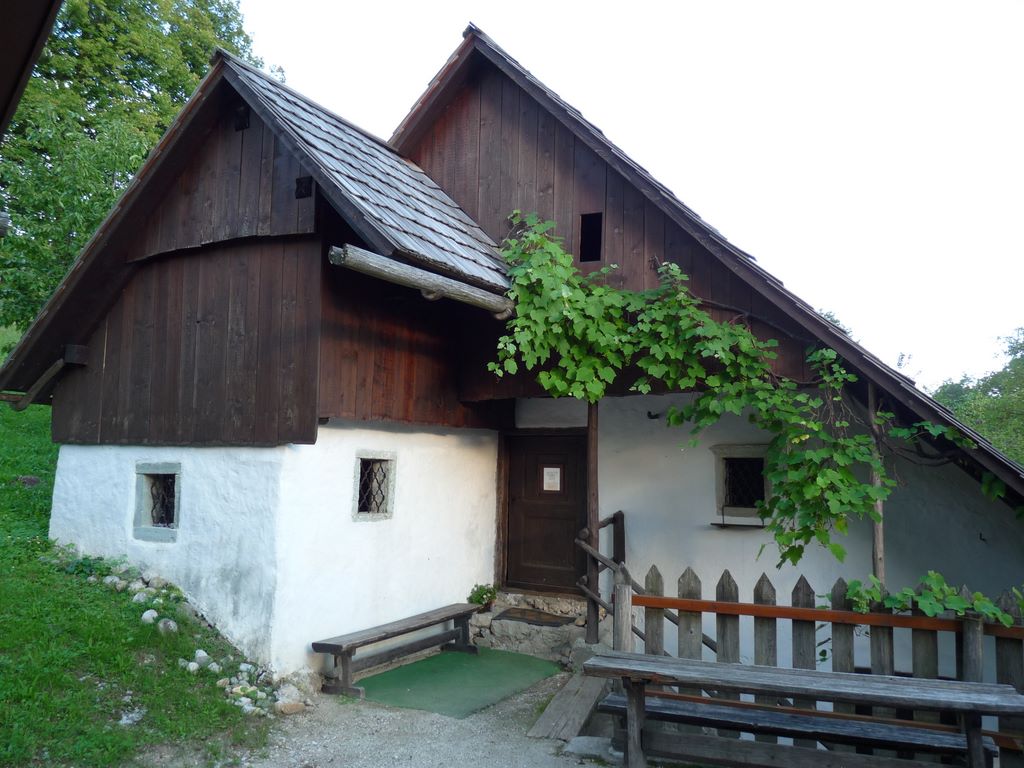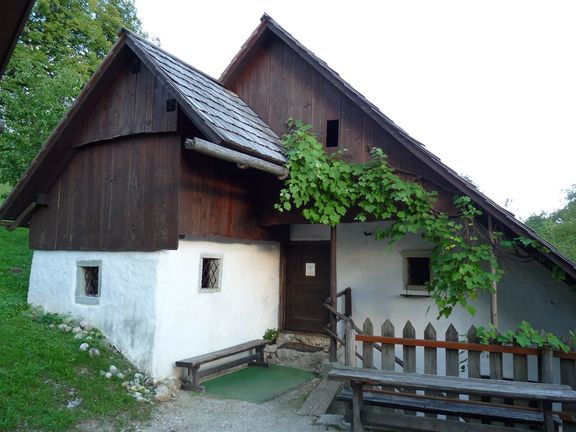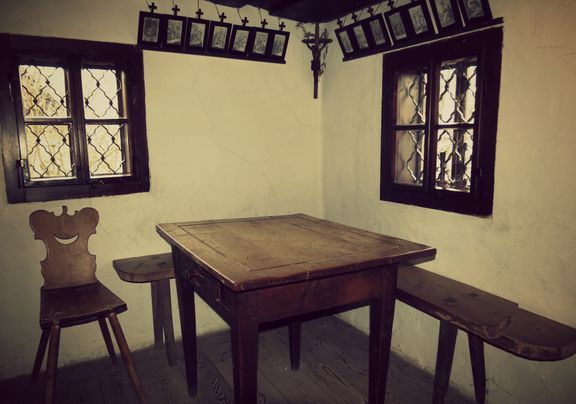Difference between revisions of "Birthplace of Fran Saleški Finžgar"
(mwtool_article) |
|||
| (12 intermediate revisions by 4 users not shown) | |||
| Line 1: | Line 1: | ||
{{Article | {{Article | ||
| − | | status = | + | | status = |
| maintainer = Janez Premk | | maintainer = Janez Premk | ||
}} | }} | ||
| Line 11: | Line 11: | ||
| fax = 386 (0) 4 580 4545 | | fax = 386 (0) 4 580 4545 | ||
| email = info@zirovnica.eu | | email = info@zirovnica.eu | ||
| − | | website = http:// | + | | website = http://visitzirovnica.si/finzgarjeva-rojstna-hisa-v-doslovcah/ |
| managed by = Žirovnica Institute for Tourism and Culture | | managed by = Žirovnica Institute for Tourism and Culture | ||
| opening hours = 9am–4pm Tue–Fri, 10am–5pm Sat, Sun, holiday. Closed Mon, 1.1., 1.5., 1.11. | | opening hours = 9am–4pm Tue–Fri, 10am–5pm Sat, Sun, holiday. Closed Mon, 1.1., 1.5., 1.11. | ||
| Line 23: | Line 23: | ||
{{Teaser| | {{Teaser| | ||
| − | The Doslovče [[Birthplace of Fran Saleški Finžgar|village house Pr' Dolenc]] in which priest, writer and playwright [[Fran Saleški Finžgar]] (1871–1962) was born was reconstructed and opened as a museum in [[established::1971]]. The house belongs among the best examples of the vernacular architecture of the Gorenjska region. | + | {{Wide image|Birthplace of Fran Saleski Finzgar 2011.jpg}} |
| + | |||
| + | The Doslovče [[Birthplace of Fran Saleški Finžgar|village house Pr' Dolenc]] in which priest, writer, and playwright [[Fran Saleški Finžgar]] (1871–1962) was born was reconstructed and opened as a museum in [[established::1971]]. The house belongs among the best examples of the vernacular architecture of the Gorenjska region. | ||
| + | |||
| + | Together with the birthplaces of [[France Prešeren]], [[Matija Čop]], and [[Janez Jalen]] this house is included on the ''Path of Cultural Heritage'' route in the [[Municipality of Žirovnica]]. | ||
}} | }} | ||
==Collection== | ==Collection== | ||
| − | The | + | The building incorporates an open-hearth kitchen (the so-called "black kitchen"), a larder, a central living area referred to as "the house" (''hiša'') with a wooden ceiling and a large central beam as well as a ceramic oven, and other rooms which reflect the humble conditions in which a rural smallholder once lived. The collection consists of the artefacts which belonged to the Finžgar family (a domestic altar, chests, a marital bed, a cradle). |
In the cellars there is a permanent exhibition on Finžgar's life and opus, which includes ''Our Blood'' [Naša kri], ''Chain'' [Veriga], ''Ruined Life'' [Razvalina življenja], and the acclaimed historical novel ''Under the Free Sun'' [Pod svobodnim soncem]. | In the cellars there is a permanent exhibition on Finžgar's life and opus, which includes ''Our Blood'' [Naša kri], ''Chain'' [Veriga], ''Ruined Life'' [Razvalina življenja], and the acclaimed historical novel ''Under the Free Sun'' [Pod svobodnim soncem]. | ||
| − | The original house in Doslovče was expanded by the | + | The original house in Doslovče was expanded by the writer's grandfather, [[Joseph Ažman]], near the end of the 18th or the beginning of the 19th century. The wooden walls were laid with planks, plastered and painted, and above the window "1849" was engraved. The house Pr' Dolenc was known for weaving cloth on a loom, and for making sheepskin coats and leather breeches. |
| + | |||
| + | ==See also== | ||
| + | * [[Birthplace of France Prešeren]] | ||
| + | * [[Birthplace of Matija Čop]] | ||
| + | * [[Birthplace of Janez Jalen]] | ||
== External links == | == External links == | ||
| − | * [http:// | + | * [http://visitzirovnica.si/finzgarjeva-rojstna-hisa-v-doslovcah/ Birthplace of Fran Saleški Finžgar web page] (in Slovenian) |
| − | * [http://www.gorenjski-muzej.videofon.si/index.php?mid=3&exhid=2 Birthplace of Fran Saleški Finžgar] on [[Gorenjska Museum | + | * [http://www.gorenjski-muzej.videofon.si/index.php?mid=3&exhid=2 Birthplace of Fran Saleški Finžgar] on [[Gorenjska Museum]] website |
| + | * [http://en.wikipedia.org/wiki/Fin%C5%BEgar%27s_house Birthplace of Fran Saleški Finžgar on Wikipedia] | ||
| + | *[http://en.wikipedia.org/wiki/Fran_Sale%C5%A1ki_Fin%C5%BEgar Fran Saleški Finžgar on Wikipedia] | ||
| + | {{gallery}} | ||
[[Category:Monuments and sites]] | [[Category:Monuments and sites]] | ||
[[Category:Museums]] | [[Category:Museums]] | ||
[[Category:Literature museums]] | [[Category:Literature museums]] | ||
| + | [[Category:Literature_museums_and_archives]] | ||
Latest revision as of 02:13, 19 February 2021
Collection
The building incorporates an open-hearth kitchen (the so-called "black kitchen"), a larder, a central living area referred to as "the house" (hiša) with a wooden ceiling and a large central beam as well as a ceramic oven, and other rooms which reflect the humble conditions in which a rural smallholder once lived. The collection consists of the artefacts which belonged to the Finžgar family (a domestic altar, chests, a marital bed, a cradle).
In the cellars there is a permanent exhibition on Finžgar's life and opus, which includes Our Blood [Naša kri], Chain [Veriga], Ruined Life [Razvalina življenja], and the acclaimed historical novel Under the Free Sun [Pod svobodnim soncem].
The original house in Doslovče was expanded by the writer's grandfather, Joseph Ažman, near the end of the 18th or the beginning of the 19th century. The wooden walls were laid with planks, plastered and painted, and above the window "1849" was engraved. The house Pr' Dolenc was known for weaving cloth on a loom, and for making sheepskin coats and leather breeches.
See also
External links
- Birthplace of Fran Saleški Finžgar web page (in Slovenian)
- Birthplace of Fran Saleški Finžgar on Gorenjska Museum website
- Birthplace of Fran Saleški Finžgar on Wikipedia
- Fran Saleški Finžgar on Wikipedia





